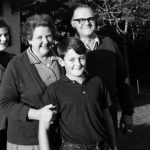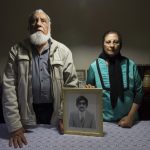Deetlefs maintains his innocence at Aggett inquest
The Security Branch officer who interrogated activist Neil Aggett before his death still insists he never used violence, despite other detainees giving evidence that he abused and threatened them.
Author:
28 February 2020

Nicolaas Johannes Deetlefs, 69, lives in KwaZulu-Natal. A decade ago, he suffered a stroke that has affected his memory. Deetlefs also has a form of throat cancer, for which he underwent an operation in 2019. He has another scheduled in March. Deetlefs came to the Johannesburg high court to give evidence from Tuesday 18 February before the reopened inquest into the death of activist Neil Aggett. He was wearing an outdated suit and sporting tinted glasses and a walrus moustache. He looked like a withered version of one of the characters in Paul Stopforth’s 1979 artwork The Interrogators.
Deetlefs interrogated Aggett in what the former security police officer claims was a brief but productive and non-violent six-hour period in 1982, a few days before Aggett’s body was found hanging from the bars of his cell at John Vorster Square police station.
Related article:
As the only witness thus far who was a member of the Security Branch and directly involved in the interrogation of Aggett, Deetlefs was subjected to a lengthy cross-examination over three days from lawyers for the Aggett family and the National Prosecuting Authority (NPA). His obdurate insistence that he was not involved in torture or assault during his time in the Security Branch – whether in the case of Aggett or those of any other detainees – frustrated his legal interrogators to the point of bringing criminal charges against him for his apartheid-era crimes.
Deetlefs’s evidence was delivered in a week in which former president FW de Klerk made comments about apartheid not being a crime against humanity. He also again denied that he had knowledge of or sanctioned any extralegal operations against anti-apartheid activists during his tenure as a member of the State Security Council. The former security police officer’s testimony is a troubling reminder of the unwillingness of those accused of past atrocities to own up to their involvement in the deaths, torture and disappearances of activists.
The interrogation
Thirty-eight years ago, Deetlefs was an adjutant officer in the Security Branch at John Vorster Square, where, as he remembers it, on Saturday 30 January 1982, he was going about his business when he was told by Lieutenant Stephan Whitehead to report for duty later.
On his arrival that evening, Deetlefs met Aggett, who was in the company of Whitehead and Lieutenant Woensdrecht, another Security Branch member. Whitehead told Deetlefs he would be required to assist with Aggett and, after a while, the two officers handed over the interrogation to Deetlefs. Once the other officers had left the room, Deetlef claims Aggett relaxed and opened up, discussing topics ranging from his background and early days growing up in Kenya to his family and relationship with Liz Floyd.
Deetlefs was initially adamant that he did not make use of violence as an interrogation method but was rather known for his ability to make detainees feel at ease. Activist and former minister of health and public enterprises Barbara Hogan contradicted this by recalling that during her interrogation, Deetlefs assaulted her and threatened to take her to a mine and kill her if she mentioned the assault to the district surgeon. When pressed during cross-examination, Deetlefs was forced to admit he had used violence against detainees but would only name Hogan as an example. He conceded to Judge MA Makhume: “My Lord, I would give a person a slap in the face.”
Related article:
Umkhonto weSizwe (MK) Veterans Association spokesperson Carl Niehaus also accused Deetlefs of torturing him during his detention in the 1980s at John Vorster Square. But Deetlef continues to deny Niehaus’ allegations, which will be heard when the latter gives evidence at the inquest.
According to Deetlefs, after lulling Aggett into a false sense of security, he asked him to write a statement. In this statement, Deetlefs says Aggett told him that his best friend, Jan Theron, was the underground leader of the South African Congress of Trade Unions. Deetlefs told the court that Aggett’s betrayal of Theron caused the activist to suddenly become uneasy. Seeing that Aggett was tired and upset, Deetlefs told him to take a nap on a camp bed in the office while he waited for Whitehead and Woensdrecht to return.
Lied under oath
Deetlefs was concerned about Aggett’s mental state, so when they returned, he warned Whitehead that he was worried that Aggett was a possible suicide risk. Deetlefs claimed he saw Aggett one last time when he was called to Whitehead’s office to answer questions about the statement he’d taken on 1 February 1982. Aggett was in the office, but Deetlefs did not speak to him. That was the last he would have the court believe he ever saw of him.
After Aggett’s death, Deetlefs was called to Whitehead’s office again and told he should not mention the warning about Aggett’s possible suicide at the upcoming inquest. Deetlefs dutifully agreed and admits he lied under oath during the original inquest to protect Whitehead and his Security Branch superiors. Deetlefs admitted under cross-examination by advocate Howard Varney, lead counsel for the Aggett family, that he also lied during his testimony in Hogan’s case of assault brought against him in 1982. Deetlefs never applied for amnesty at the Truth and Reconciliation Commission (TRC) for his involvement in either the Aggett or Hogan interrogations.
Neither the NPA nor the Aggett family are satisfied with Deetlefs’ testimony, and although his lawyer informed the court that his lengthy cross-examination had taken a toll on his health – leading him to lose sleep and suffer memory lapses – he will now face possible prosecution.
Varney told Deetlefs: “I’m not going to trouble you with the legal argument, but we’ll be submitting that both Whitehead and [Major Arthur] Cronwright are responsible for the murder of Dr Aggett. Mr Deetlefs, where this impacts on you – since you have admitted under oath a number of times, in your affidavit as well as your evidence, that you helped to cover up, you agreed to stay quiet – we will be putting up to this court that in covering up, in keeping silent, you were an accessory to murder.”
Like De Klerk, Deetlefs continues to refuse to change his story even when faced with insurmountable evidence. A recent report by the Mail & Guardian revealed that the NPA may charge De Klerk for his alleged role in authorising the murder of the Cradock Four in 1985.
Related article:
Cold comfort
On 24 February 2020, it was announced that Makhume had been hospitalised and so, for now, the Aggett inquest is on hold until further notice. It was also announced that after a long battle and in spite of the death in 2019 of the last surviving security police officer involved in Hoosen Haffejee’s detention, the inquest into the 1977 death of the Pietermaritzburg dentist will be heard from 20 April to 15 May.
Related article:
Former Security Branch administrative clerk Joao Rodrigues is also scheduled to appear back in court for his alleged involvement in the death of activist Ahmed Timol, which Rodrigues has petitioned the Supreme Court of Appeal to have dismissed. Finally, in October, the trial of the former security police officers implicated in the abduction, torture and murder of MK activist Nokuthula Simelane will get back under way after four years of delays.
A lack of witnesses and the deaths of alleged perpetrators may hamper the outcomes of these prosecutions. But there is cold comfort to be had for families that the NPA is finally delivering on its promise to prosecute. Whether the Presidency or the Zondo Commission will address the allegations of political interference into the NPA’s mandate to prosecute the post-TRC cases remains to be seen.




